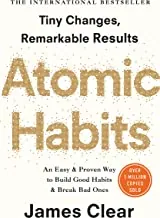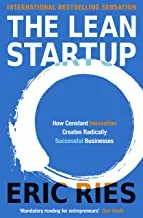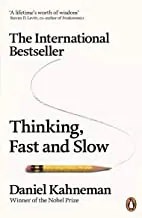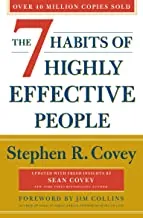5 Best Entrepreneurial Books
Discover the top 5 entrepreneurial books of all time! Our expert review provides insights into each book, helping you choose the perfect read to boost your business skills.
When considering whether to buy a book, it can be helpful to read reviews from other readers or literary critics. Reviews can provide insights into the book’s strengths and weaknesses, the quality of the writing, and the overall reading experience. By reading reviews of these entrepreneurial books, you can get a better sense of whether a book is likely to be a good fit for your interests and preferences. So before making a purchase, take the time to read the reviews and make an informed decision.

ATOMIC HABITS BY JAMES CLEAR
This book explores the power of small habits and how they can be used to create positive change in both personal and professional life. Atomic Habits is one of the excellent entrepreneurial books that provides a practical and effective framework for building good habits and breaking bad ones.
It is an easy read, yet it provides a lot of valuable insights and strategies that can be applied to any aspect of life. I would highly recommend this book to anyone who is looking to improve their habits and achieve their goals.
Atomic Habits Review
I would highly recommend this book to anyone who is looking to improve their habits and achieve their goals.
Atomic Habits by James Clear is a must-read book for anyone who wants to improve their habits and achieve their goals. The book provides a practical and actionable framework for building and maintaining good habits, while breaking bad ones.
Clear's writing style is engaging, clear and concise, making it easy to understand and follow his suggestions. He uses examples from his personal life and research to illustrate his points, which adds credibility to his ideas.
One of the strengths of Atomic Habits is the emphasis on small, incremental changes that build up over time. Clear emphasizes that change does not happen overnight, and that the key to building good habits is to focus on consistency and making small improvements every day. He also emphasizes the importance of tracking progress and using positive reinforcement to stay motivated.
Another aspect of the book that I found particularly useful was the discussion of the four laws of behavior change - cue, craving, response, and reward. Clear explains how each of these laws influences our habits and how we can use them to our advantage.
Buy from Amazon
The Lean Startup by Eric Ries
This book is another gold pice among the entrepreneurial books. The Lean Startup is a must-read for anyone interested in entrepreneurship and starting a business. Ries presents a clear and practical framework for building a successful startup, based on real-world experience and research.
Whether you’re a seasoned entrepreneur or just starting out, “The Lean Startup” offers valuable insights and practical advice that can help you succeed in the competitive world of business.
The Lean Startup Review
The Lean Startup by Eric Ries is a groundbreaking book that presents a unique approach to starting and growing a successful business. The book challenges the traditional business model of creating a detailed business plan and then executing it over a long period of time. Instead, Ries advocates for a more iterative and adaptable approach that focuses on creating a minimum viable product (MVP) and then testing it with customers to get feedback and make improvements.
One of the key concepts in the book is the Build-Measure-Learn feedback loop. Ries argues that successful entrepreneurs should focus on building a product or service quickly, measuring its impact on customers, and learning from that data to improve and refine the product. This process should be repeated over and over again, using customer feedback to guide product development and decision-making.
Another important concept in the book is the idea of validated learning. Ries emphasizes the importance of using data and customer feedback to validate assumptions and test hypotheses about the market and the product. By measuring and analyzing customer behavior, entrepreneurs can make informed decisions and avoid wasting time and resources on ideas that aren't likely to succeed.
The book is filled with examples and case studies that illustrate the concepts and make them easy to understand and apply.
Buy from Amazon
Thinking Fast and Slow by Daniel Kahneman
It is a thought-provoking and insightful book that challenges readers to rethink how they approach their own decision-making processes. I highly recommend this book to anyone interested in psychology, economics, or self-improvement.
Thinking Fast and Slow is a valuable read for anyone who wants to better understand how the mind works and how to make better decisions.
Thinking Fast and Slow Review
Thinking, Fast and Slow by Daniel Kahneman is a fascinating exploration of how humans make decisions and judgments. Kahneman, a Nobel Prize-winning economist, presents a comprehensive analysis of the two primary systems of thought that humans use: the fast, intuitive, and emotional System 1, and the slower, more deliberative, and rational System 2.
Kahneman delves into how these systems of thinking work together and how they can lead to biases and errors in judgment. He examines a wide range of topics, including optimism, overconfidence, framing effects, and heuristics. Through his engaging writing style and numerous examples, Kahneman explains how the mind can be fooled by various cognitive biases and how these biases can be overcome through thoughtful analysis and reflection.
One of the key strengths of this book is its accessibility. Despite being a work of academic rigor, "Thinking, Fast and Slow" is written in a way that is easy to understand for both academics and general readers. The author also provides practical examples and exercises that readers can use to identify and overcome their own biases.
Buy from Amazon
The 7 Habits of Highly Effective People by Stephen Covey
This classic book provides a framework for personal and professional growth through a set of seven habits that promote effectiveness and success.
Whether you are a student, a professional, or simply looking to improve your personal life, this book is a must-read.
The 7 Habits of Highly Effective People Review
The 7 Habits of Highly Effective People is a self-help book written by Stephen Covey that has sold over 25 million copies worldwide. In this book, Covey presents seven habits that he believes are essential for achieving personal and professional success.
The seven habits outlined in the book are based on principles such as proactivity, prioritization, and continuous improvement. Covey encourages readers to take ownership of their lives, set clear goals, and develop effective communication skills.
One of the strengths of the book is that Covey uses relatable examples to illustrate his points, which helps readers apply the principles in their own lives. He also stresses the importance of personal integrity and character, which he believes are key to long-term success.
The 7 Habits of Highly Effective People is a timeless classic that provides practical advice on how to improve one's life and achieve success.

Good to Great by Jim Collins
This book explores what separates good companies from great ones, using extensive research and case studies to identify the key factors that lead to sustained success. Overall, Good to Great is an excellent read for anyone interested in management and business.
It provides practical and actionable advice that can be applied to businesses of all sizes. It is a must-read for business leaders looking to take their organizations to the next level.
Good to Great Review
Good to Great is a management book written by Jim Collins. The book explores the success stories of 11 companies that went from being good to great and sustained their performance for at least 15 years. The book is based on a five-year research project conducted by Jim Collins and his team.
The book emphasizes the importance of disciplined people, disciplined thought, and disciplined action. Collins identifies several key concepts, including the Hedgehog Concept, the Flywheel Effect, and the Level 5 Leadership.
The Hedgehog Concept is the idea that companies should focus on their core strengths and avoid diversification. The Flywheel Effect emphasizes the importance of making small improvements consistently over time, resulting in large-scale change. Level 5 Leadership is the concept of leaders who combine personal humility with fierce resolve, inspiring their team to greatness.
What sets Good to Great apart from other management books is its focus on empirical data and research, rather than just personal anecdotes. Collins and his team analyzed the data of hundreds of companies to arrive at their findings. The book provides valuable insights into what it takes for a company to become great and stay that way.
Buy from Amazon